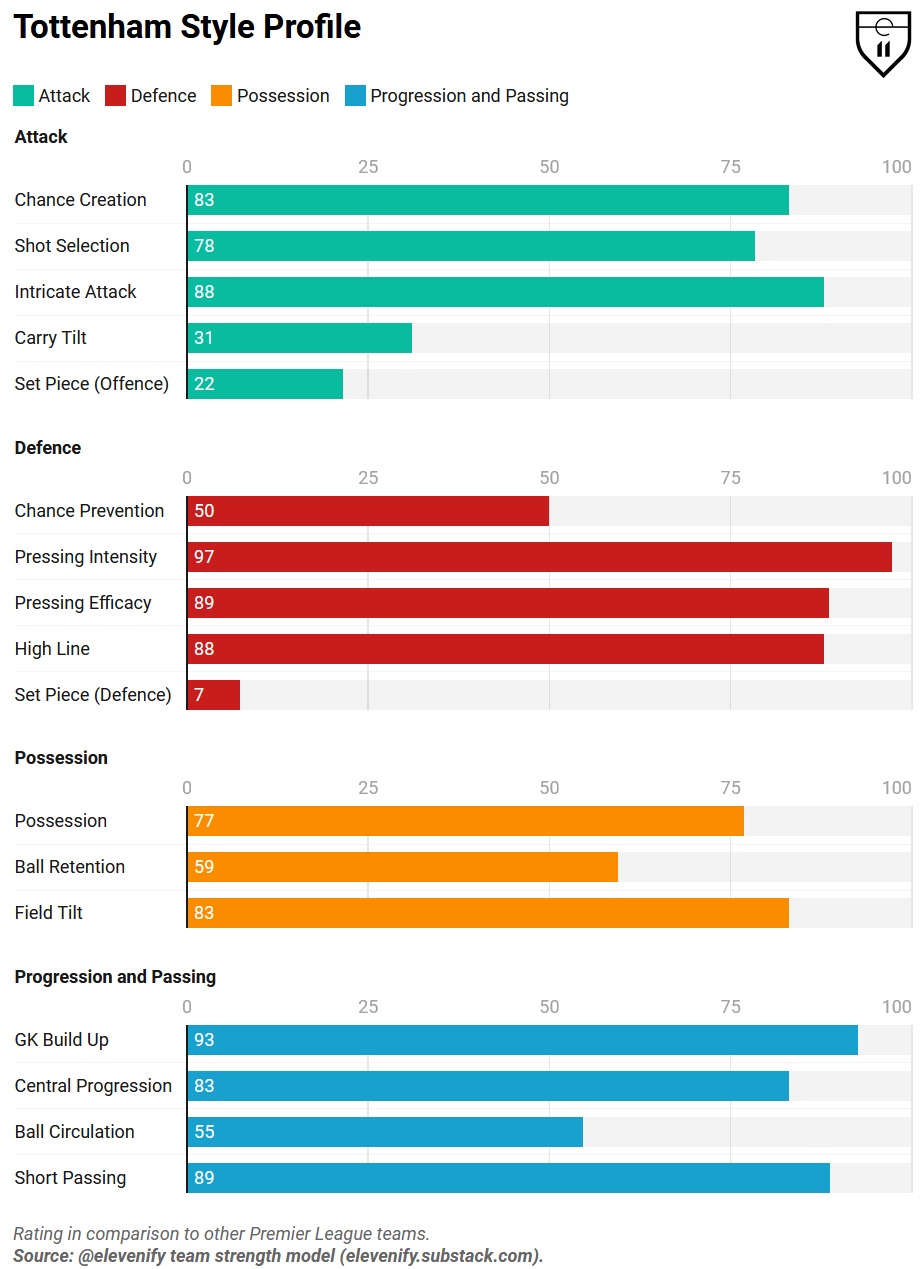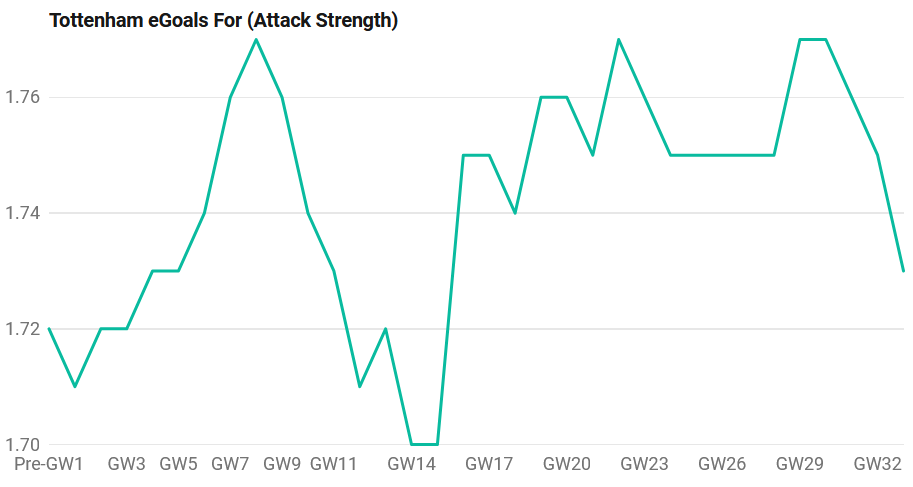“People have been telling me my whole career I’ve only got a Plan A – and they are right! My Plan A is to win things. That’s all I’ve tried to do my whole career and as long as I’m winning things then it’s a pretty good bet to keep doing what I’m doing… If I stop winning things then maybe I’ll look to change the way my teams play.” - Ange Postecoglou
As a Premier League fan, I am thrilled Ange Postecoglou is now part of the 20. In a short time, he's transformed Tottenham’s play style with clear ideas and impressive player development. They're now among the league's best in Build Up and Pressing:
Attack
Their attack has generated ~48 xG from Open Play, ranking third-best in the league. Despite this, my model indicates that Tottenham have essentially maintained their attacking strength since Postecoglou took over. They've gone from a baseline of scoring 1.72 goals per game at the start of the season to 1.73 goals per game as of GW33.
Stepping back, I see this as a success. Tottenham's attack has improved only marginally compared to last season, yet they've forged a distinct new playing identity despite losing Harry Kane, one of the Premier League’s star production monsters of recent years. The significance of his departure cannot be underestimated in terms of output:
Defence
Most agree that Ange’s start has been positive for the attacking reasons above. However, their defence remains a critical barrier to becoming a top-tier team. This season, their goals conceded baseline has risen from 1.43 at the start to 1.54 by GW33.
Their defensive decline has relegated them to the 11th-best defence in my model, which aligns closely with the raw numbers, as they also rank 11th in xGA with 53 xG conceded. This undermines their potent attack, leaving them with just a +2.6 xGD (7th best).
In discussions about vying for top spots in the league, it's crucial to contextualize this defensive struggle. Rarely in the past decade has a team with such a poor goal difference realistically challenged for the top 4, let alone the title. Even this season, there's a substantial gap with the top 3 teams boasting xGDs of 35, 37, and 41.
No team consistently competing for the top 4 can overcome such defensive weakness through attacking prowess alone. While Klopp's Liverpool is often cited as a blueprint for attacking your way to a title, their defensive solidity is often overlooked. They never conceded this many chances.
You simply can’t be a top team with this lack of defensive control. It does not matter how good your attack is if it is not in a sensible ratio to your defence. There is a ‘minimum viable product’ of defensive resilience that remains the cornerstone of any successful campaign in the Premier League.
Overall
You can see how these attack and defence changes come together with the overall picture here:
Combining and simplifying these baselines we can see that, overall, Tottenham are a worse team now than they were at the end of last season:
The Way Forward
How do Tottenham improve from here?
Regarding the attack, I believe there's potential for incremental gains as the current personnel better assimilate Ange's ideas. Moreover, recruiting a 1vs1 specialist could enhance Tottenham's ability to create chances against low-block defences. These offensive strides can be made without further compromising their defensive stability. A recent precedent for this is the start of De Zerbi's tenure at Brighton, where he maintained Potter’s defensive solidity while significantly boosting their attacking output.
Defensively, there's a pressing need for tactical adjustments to minimize chances conceded. Depending solely on the speed of Van de Ven and the shot-stopping abilities of Vicario is not a viable long-term strategy.
Overall, an immediate improvement for Tottenham at both ends of the pitch would be focusing on set pieces. They've generated only 7.7 xG from set plays (the third lowest in the league) and conceded 13.8 xG from set plays (the third highest).
Whether it is hiring a dedicated set piece coach or improving with the coaching staff there already, this needs to improve.
Adding depth in the summer window will also be crucial if European football is achieved. Adding European football is not easy. It alters training schedules and brings more games at a higher level. It’s a big challenge for squad and fatigue management.
While this analysis may seem somewhat pessimistic, I maintain a positive long-term outlook for Tottenham under Postecoglou. I just believe they are further away than generally perceived. Considering the numbers, truly competing next season is too ambitious. Realistically, Tottenham may be poised to challenge for the league title in the 2025/26 season.
While my projected timeline could prove inaccurate (and I hope it is), one thing I am confident about is that when the time does come, Tottenham's defence will have improved.
To Compete is to Defend.











